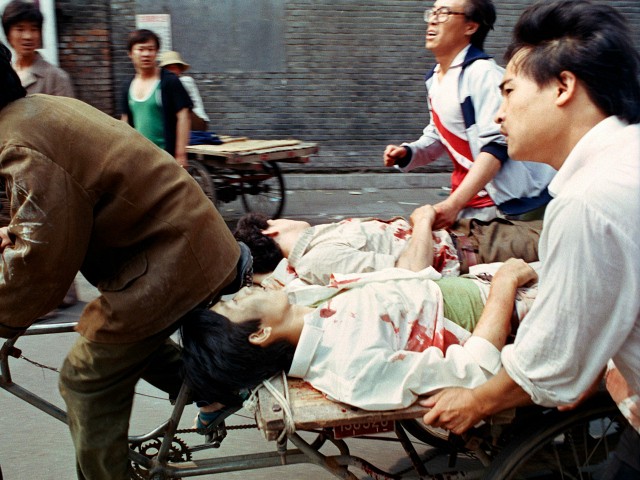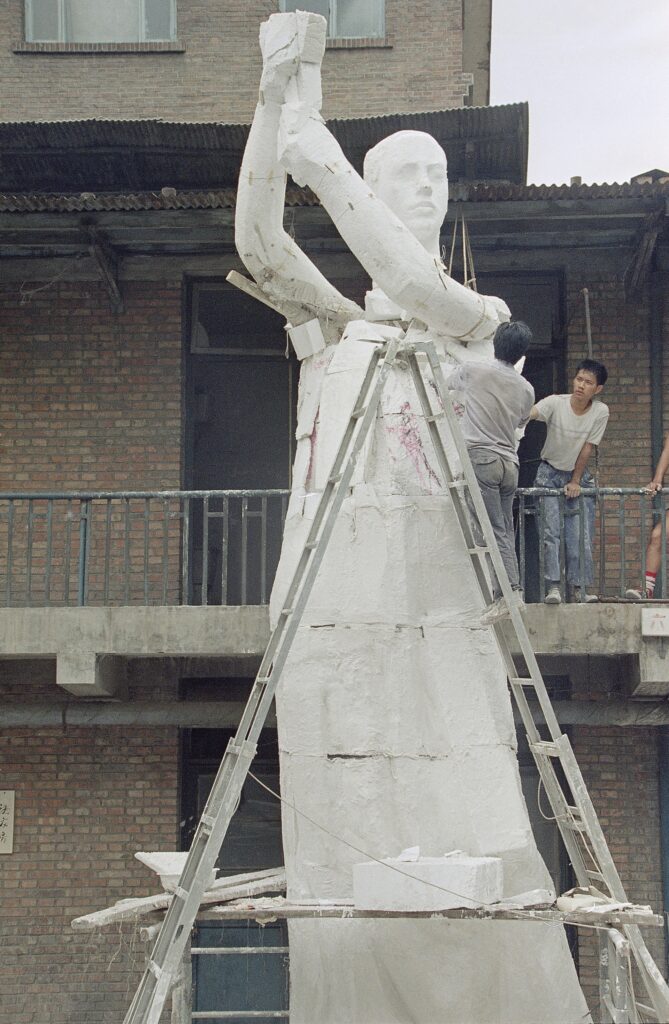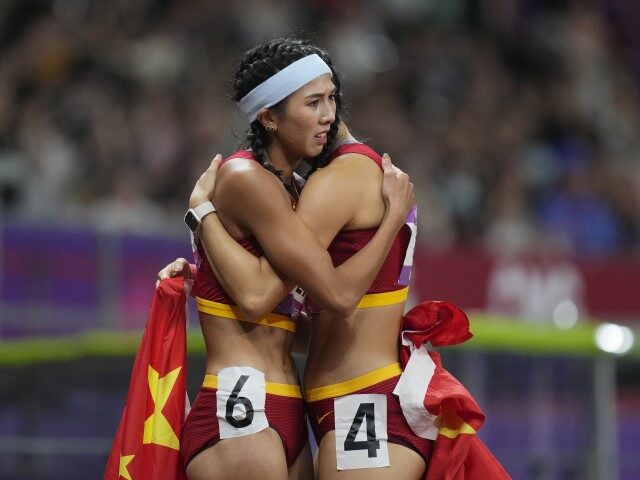A photo of two women track and field athletes embracing after a particularly contentious Asian Games event prompted widespread online censorship in China this week as a result of their assigned numbers – six and four, which together form the date of the 1989 Tiananmen Square massacre, June 4.
Runners Lin Yuwei, the gold medalist in the event, and Wu Yanni, who was disqualified from a silver medal over a false start, hugged each other in their national regalia and draped in the Chinese flag, creating an image of apparent unity and solidarity on China’s “National Day,” the anniversary of mass murderer Mao Zedong imposing communism on the country. The state television network CCTV shared the image in its coverage of the race on Weibo, China’s largest legal social media outlet.
By Tuesday, the photo had disappeared from state media, prompting widespread confusion among Chinese social media users over why it was censored, as China has for decades censored any mention of the Tiananmen massacre and many Chinese citizens do not know it happened.
The Chinese Communist Party never explains its censorship to the public, but regularly deletes content from social media that in any way could be interpreted as a reference to the 1989 killings, including overt references such as “Tiananmen Square” and the date of the beginning of the massacre – June 4, 1989 – but also a vast array of potentially related items such as candle emojis (used in online candlelight vigils for the dead); the numbers six, four, and 1989; and even the word “today” if typed into a Chinese government social media search engine on the anniversary. The word “tank,” potentially a reference to an iconic photo of a protester staring down a Chinese military tank holding only what appears to be a grocery bag, also faces censorship online in China, particularly as the anniversary of the event approaches.

In this June 4, 1989 file photo, a rickshaw driver peddles wounded people, with the help of bystanders, to a nearby hospital in Beijing after they were injured during clashes with Chinese soldiers in Tiananmen Square. The crackdown ended a period of relative political openness, led to the downfall of Communist Party leader Zhao Ziyang, and plunged Beijing into diplomatic isolation that lasted until the late 1990s. (Liu Heung Shing, File/AP)
Beijing also regularly limits the widespread use of virtual private network (VPN) technology on June 4 to stop citizens from reading about the massacre, a phenomenon that has led some Chinese to jokingly call June 4 “Internet Maintenance Day.”
In the photo of Lin and Wu, the women are wearing the numbers six and four on their legs, their preassigned lane numbers. The numbers appear side-by-side, apparently forming the date of the massacre.
The Tiananmen Square massacre is one of communist China’s most notorious human rights atrocities – though, given that historians estimate Mao Zedong killed 45 million people during the “Great Leap Forward,” the 1989 killings are far from the most numerous. At the time, in response to the decline of the Soviet Union and communism in much of Europe, young Chinese people, many of them students, began organizing protests demanding their government respect their fundamental rights and freedoms. In Tiananmen Square, the heart of Beijing, protesters peacefully convened demanding basic rights and famously erecting a statue known as the Goddess of Democracy.

Students at Beijing’s Central Academy of Fine Arts, put the finishing touches on the Goddess of Democracy, modeled after the Statue of Liberty, May 29, 1989 in Beijing. The styrofoam statue will be taken to the Tiananmen Square protesters once it is completed. (Liu Heung Shing/AP)
The Communist Party responded to the protest with the indiscriminate mass murder of the protesters, using armored vehicles to crush many of them. The ultimate death toll remains unknown to this day but is estimated to be at least 10,000 people.
The Party has spent decades erasing the memory of that day with significant success in China, as indicated by baffled social media users trying to figure out why the Asian Games photo disappeared.
“Taiwan-based exiled dissident Gong Yujian said some people inside China didn’t know why the photo had disappeared from view, and had speculated that the numbers had some kind of pornographic meaning,” Radio Free Asia (RFA) reported on Tuesday.
Gong lamented to the outlet that, for most Chinese people within the country, “unless they have personal experience of it, or they circumvent the Great Firewall, they won’t know anything about this chapter in their own history.”
Chinese state media did not shy away from covering the 100m hurdle race from which the photo emerged, however. The English-language Global Times propaganda newspaper celebrated the Chinese athletes, with particular support for Wu given her disqualification. Wu lost her silver medal on the grounds that she began the race early – a false start, for which she issued a statement saying she “deeply apologized” to fans.
“Chinese netizens expressed support for Wu and encouraged her to prepare better for the Paris 2024 Olympic and Paralympic Games,” the Global Times reported. “Netizens expressed their support and encouragement for Wu, with one saying that ‘mistakes in sports competitions can be understood, but what’s more important is the intention to bring glory to the country.'”
Canada’s Globe and Mail observed in its coverage of the image censorship on Thursday that it is Wu’s second time embroiled in similar censorship. In a separate semi-final, the newspaper noted, “she was racing in lane nine and shook hands with the racer next to her, creating ’89.’”
That image also disappeared from Chinese social media.
No evidence suggests at press time that Wu has deliberately attempted to make political statements about the Tiananmen Square massacre, or that she even knows it happened.

COMMENTS
Please let us know if you're having issues with commenting.